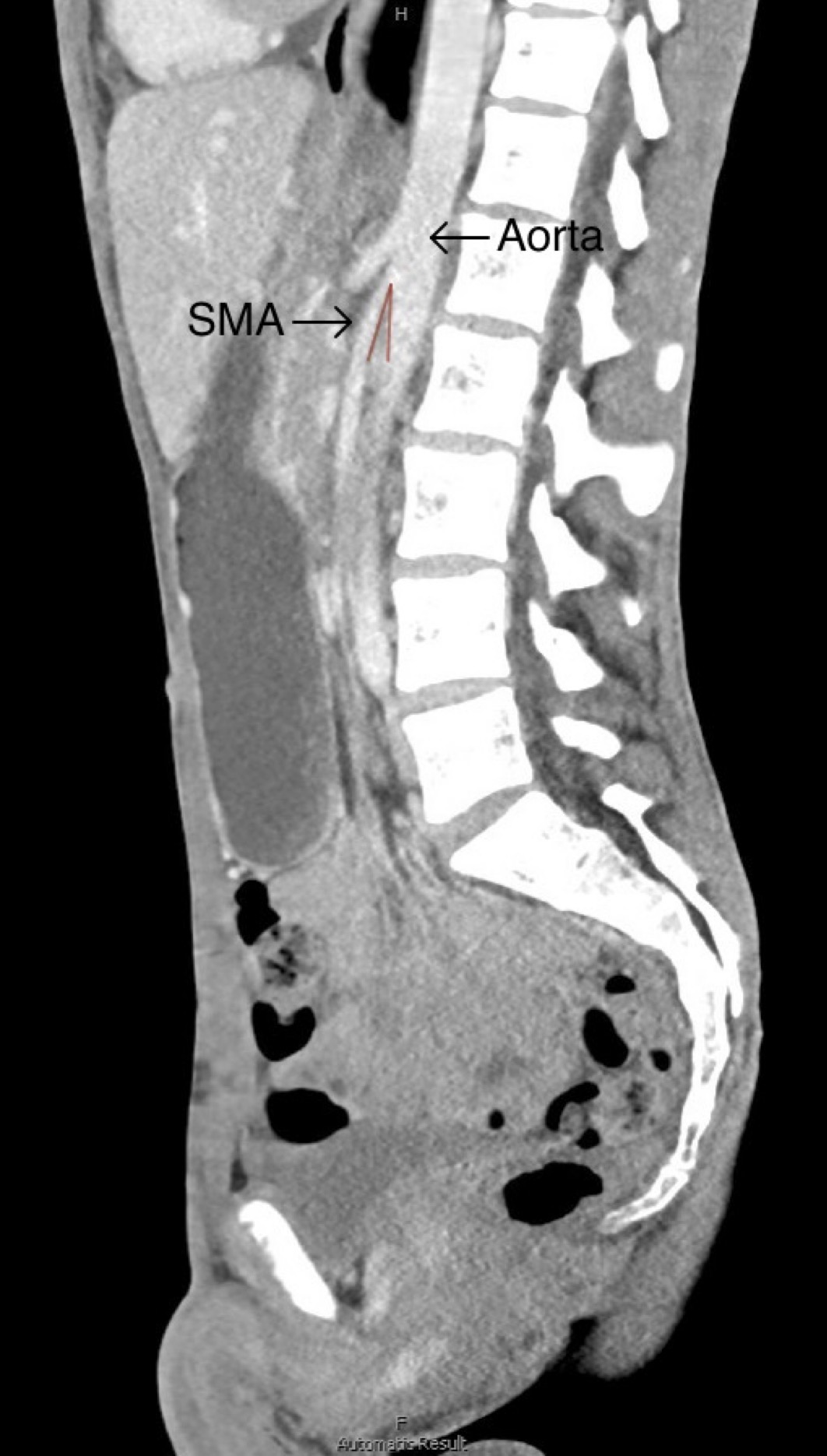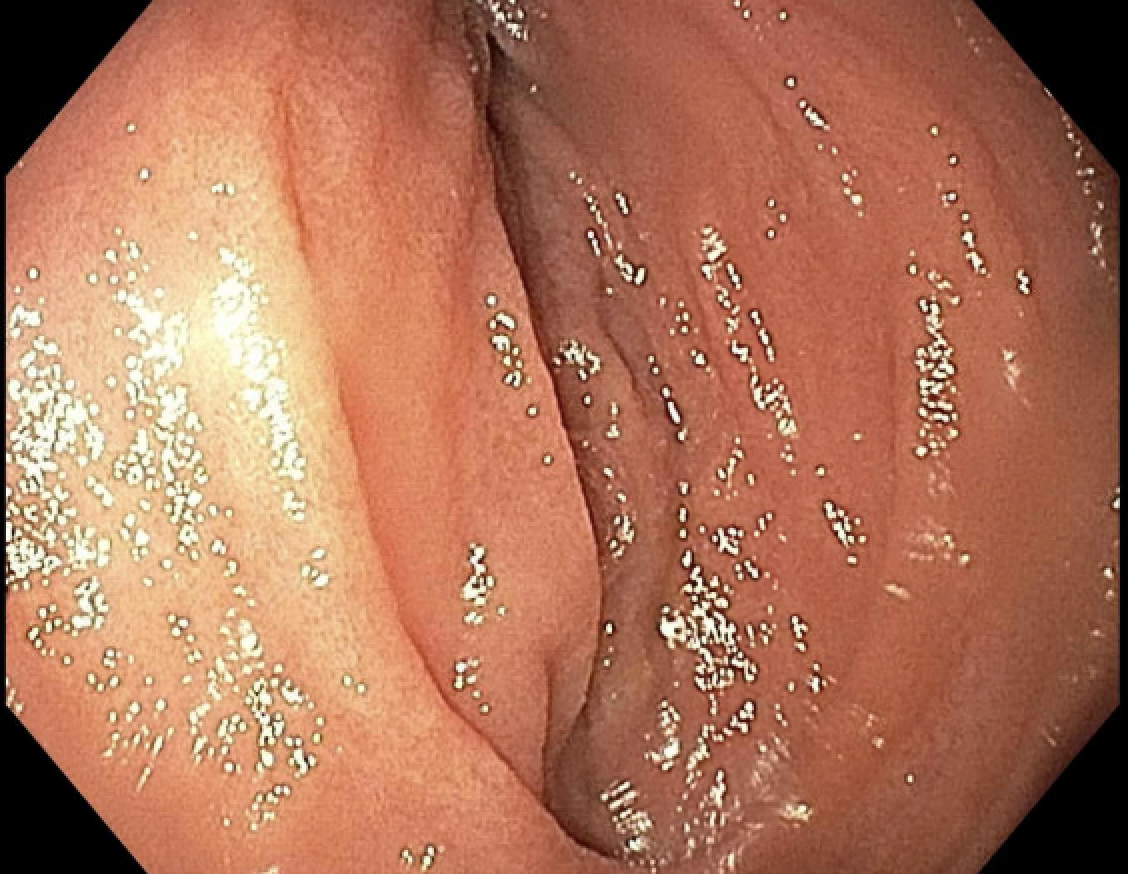Monday Poster Session
Category: Small Intestine
P4085 - An Unusual Case of Superior Mesenteric Artery Syndrome in a Young Adult Induced by Prolonged Fasting During Ramadan
Monday, October 27, 2025
10:30 AM - 4:00 PM PDT
Location: Exhibit Hall

Stephanie Ren, MD
NYU Langone Health
Mineola, NY
Presenting Author(s)
Stephanie Ren, MD, Laura DiBenedetto, DO, Murad H.. Ali, MD, Deepak Desai, MD
NYU Langone Health, Mineola, NY
Introduction: Superior mesenteric artery (SMA) syndrome is an uncommon cause of proximal intestinal obstruction, often following significant weight loss. Its development following prolonged elective fasting is infrequently reported. This case highlights SMA syndrome in a healthy young adult male following prolonged elective fasting requiring aggressive nutritional approach with total parenteral nutrition.
Case Description/
Methods: A 19-year-old male with no significant past medical history presented with a 30-pound weight loss over two months, accompanied by early satiety, decreased oral intake, postprandial abdominal discomfort, and nausea. These symptoms developed in the context of a month-long religious fast. Shortly before presentation, he experienced subjective fevers and chills, followed by five episodes of non-bloody emesis shortly after eating.
On presentation, his BMI was 16.6 kg/m². CT imaging revealed marked gastric and proximal duodenal dilation with abrupt narrowing at the level of the SMA and aorta. Due to poor nutritional status and complete oral intolerance, a nasogastric tube and a peripherally inserted central catheter were placed, and TPN was initiated. Despite these interventions, his weight continued to decline, prompting consideration of surgical intervention.
Further evaluation with EGD revealed a Hill Grade II gastroesophageal flap valve and extrinsic compression of the third and fourth portions of the duodenum, which were traversed using a pediatric colonoscope. An upper gastrointestinal series demonstrated mild compression of the fourth portion of the duodenum with to-and-fro motion and antegrade flow into the jejunum, without significant gastric or proximal duodenal distention.
The patient was ultimately managed non-surgically and demonstrated weight gain and complete resolution of symptoms at outpatient follow-up.
Discussion: While SMA syndrome in children is typically linked to inadequate weight gain relative to linear growth, and in adults to chronic illness or postoperative states, this case highlights an unusual trigger: prolonged elective fasting for religious reasons in an otherwise healthy young adult. In this case, the severity of symptoms and continued weight loss necessitated an aggressive nutritional approach. The clinical course supports the hypothesis that once duodenal obstruction is established, a self-perpetuating cycle of oral intolerance and further weight loss may ensue, requiring early and intensive nutritional intervention to interrupt the cycle.

Figure: Sagittal view of CT abdomen/pelvis showing compression of the duodenum from the superior mesenteric artery

Figure: Stenosis of the second portion of the duodenum
Disclosures:
Stephanie Ren indicated no relevant financial relationships.
Laura DiBenedetto indicated no relevant financial relationships.
Murad Ali indicated no relevant financial relationships.
Deepak Desai indicated no relevant financial relationships.
Stephanie Ren, MD, Laura DiBenedetto, DO, Murad H.. Ali, MD, Deepak Desai, MD. P4085 - An Unusual Case of Superior Mesenteric Artery Syndrome in a Young Adult Induced by Prolonged Fasting During Ramadan, ACG 2025 Annual Scientific Meeting Abstracts. Phoenix, AZ: American College of Gastroenterology.
NYU Langone Health, Mineola, NY
Introduction: Superior mesenteric artery (SMA) syndrome is an uncommon cause of proximal intestinal obstruction, often following significant weight loss. Its development following prolonged elective fasting is infrequently reported. This case highlights SMA syndrome in a healthy young adult male following prolonged elective fasting requiring aggressive nutritional approach with total parenteral nutrition.
Case Description/
Methods: A 19-year-old male with no significant past medical history presented with a 30-pound weight loss over two months, accompanied by early satiety, decreased oral intake, postprandial abdominal discomfort, and nausea. These symptoms developed in the context of a month-long religious fast. Shortly before presentation, he experienced subjective fevers and chills, followed by five episodes of non-bloody emesis shortly after eating.
On presentation, his BMI was 16.6 kg/m². CT imaging revealed marked gastric and proximal duodenal dilation with abrupt narrowing at the level of the SMA and aorta. Due to poor nutritional status and complete oral intolerance, a nasogastric tube and a peripherally inserted central catheter were placed, and TPN was initiated. Despite these interventions, his weight continued to decline, prompting consideration of surgical intervention.
Further evaluation with EGD revealed a Hill Grade II gastroesophageal flap valve and extrinsic compression of the third and fourth portions of the duodenum, which were traversed using a pediatric colonoscope. An upper gastrointestinal series demonstrated mild compression of the fourth portion of the duodenum with to-and-fro motion and antegrade flow into the jejunum, without significant gastric or proximal duodenal distention.
The patient was ultimately managed non-surgically and demonstrated weight gain and complete resolution of symptoms at outpatient follow-up.
Discussion: While SMA syndrome in children is typically linked to inadequate weight gain relative to linear growth, and in adults to chronic illness or postoperative states, this case highlights an unusual trigger: prolonged elective fasting for religious reasons in an otherwise healthy young adult. In this case, the severity of symptoms and continued weight loss necessitated an aggressive nutritional approach. The clinical course supports the hypothesis that once duodenal obstruction is established, a self-perpetuating cycle of oral intolerance and further weight loss may ensue, requiring early and intensive nutritional intervention to interrupt the cycle.

Figure: Sagittal view of CT abdomen/pelvis showing compression of the duodenum from the superior mesenteric artery

Figure: Stenosis of the second portion of the duodenum
Disclosures:
Stephanie Ren indicated no relevant financial relationships.
Laura DiBenedetto indicated no relevant financial relationships.
Murad Ali indicated no relevant financial relationships.
Deepak Desai indicated no relevant financial relationships.
Stephanie Ren, MD, Laura DiBenedetto, DO, Murad H.. Ali, MD, Deepak Desai, MD. P4085 - An Unusual Case of Superior Mesenteric Artery Syndrome in a Young Adult Induced by Prolonged Fasting During Ramadan, ACG 2025 Annual Scientific Meeting Abstracts. Phoenix, AZ: American College of Gastroenterology.
